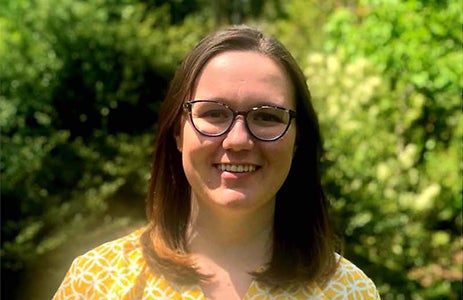
Sarah, what led to your decision to complete the RPI online Master of Engineering in Mechanical Engineering degree?
Many senior engineers at Sikorsky have graduate degrees. It just made sense to complete the program given my career plans. For those who have advanced degrees at Sikorsky, many speak very highly of RPI’s programs. I selected the program because I wanted to study within a cutting-edge technical space.
When considering other graduate degree options, how did this one stand out for you?
RPI’s history with Sikorsky is extensive, so the program is well-tailored to my industry and fits perfectly with my professional goals. I liked the project-based aspect of the curriculum and the fact that it was online – and I didn’t have to travel to campus to earn the degree - was a plus. I will admit, it took a minute to get used to the virtual platform, but honestly, the experience was so seamless.
Of the 10 courses to complete the degree, did you have a favorite?
They were all my favorites! The Lean Six Sigma course was outstanding. Yes, it was technical, however, there were also soft skills baked into the experience, such as role-playing, conflict resolution, and managing relationships within cross-culture projects. But, if I had to choose a favorite course, it would be finite element method:
We do a lot of finite element analysis at Sikorsky, which we correlate to test data, and then we turn it into a product and give it to our end-user / customer. With Professor Gutierrez-Miravete advising my project work in the course, it was exciting to view the breakdown of the finite element method – including how the software would perform the analysis. Not just what happens when I enter an input, but what would occur before receiving an output. And knowing that, the input I give will likely achieve a desired result that's meaningful, accurate, and has validity to it.
What about the professional project courses in the program? What did you learn?
I evaluated the rotating components of a helicopter - taking into account controls and basic geometries, and all the complex, final components that go on the aircraft. For professional project one, I completed a stress analysis for a rotating component and in the second professional project, I completed a modal analysis for that same component.
Given the course work and projects completed in the program, I could see where the high peaks of stress were and how the software calculated them. Then, I assessed how the iteration of stress analysis can inform tweaking the final design to reconfigure the size of a component, for example, while considering a reduction in weight and cost.
As a result, I could work better with others responsible for structural analysis and in collaboration with them, come to a resolution or iteration of design - quicker.
The modal analysis in the second semester was a bit more abstract. Through the project work, I became much more comfortable and familiar with it. When analyzing dynamic components of a helicopter, we’re looking at thrust, rotation, etc. What I learned was - we cannot just be concerned about stress or vibration alone. We must add so many other variables to the equation and look at it as a complex system, such as resonance frequencies, as one example.
At Sikorsky, we are constantly pushing the boundaries of rotorcraft technology, such as a coaxial rotor. The vibration study changes dramatically because the rotors are rotating counter to each other.
What’s so exciting about the opportunity to analyze stress and vibration is to consider how it can be applied to our legacy products as well as our new product designs.
Now that you have completed your Masters, has anything changed for you at work?
Given the professional projects and mechanical engineering degree coursework, I can now have conversations with the foundational knowledge necessary to learn from our legacy engineers - without wasting time and resources - keeping pace on the delivery of products at a good rate moving forward.
Is there anything you think others should know about the program?
My graduate study experience at RPI reminded me of the culture here at Sikorsky: everyone is supportive, intelligent, and invested in the project at hand. I really felt like I was part of a family in the program. It makes me kind of sad to have finished, in a way. However, I look forward to staying connected with RPI given the genuine relationships with the staff, faculty, and other students.
After speaking with Sarah, Bonnie had to circle back to Sarah’s RPI graduate advisor, Ernesto Gutierrez-Miravete - so pleased to let him know what Sarah had shared. He was equally enthusiastic:
Sarah’s success in the program was in large part due to her commitment to her graduate study and projects. She was persistent and maintained a steady pace at understanding concepts that are some of the most challenging.
Hearing what Sarah has shared with you reminds me of a very rudimentary approach to computer analyses and experimentation. Garbage in, garbage out. With the very best computer hardware and software available, if you don’t understand how the analysis is calculated, particularly in technical disciplines, there is a significant risk in producing outcomes that are superficial and meaningless.
I stress to my graduate students that computer simulation can be a very dangerous thing. Don’t settle for fantastic visuals! Know better through high-end analysis that can be achieved by the human brain, as well. Like Sarah, engineers are better served understanding how the computations are made, so that they can be more conscious and aware of their approach to analysis and the reliability of outcomes received. Sarah knows this, and I trust she will continue to produce great work.